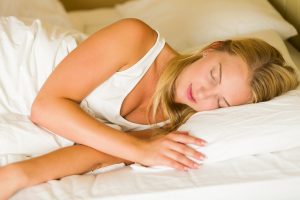What is the perfect temperature for a good night’s sleep? Do you have issues with sleeping lately? If the answer is yes, you are not alone especially in difficult and stressful times. The trouble with sleep can be caused by the simple disruption of daily routine or anxious thoughts. Many people around the globe have restless nights which might not come as a surprise when you think about all the things you have no control of at the moment. Not everything is under our control and we are aware of that but at least we always had control of waking up and going to work. Now, when most of us are working from home, the routine is different. However, let’s keep in mind that we have one thing under our control – the temperature of our bedroom.
What is the optimal temperature for a good night’s rest?
Let’s start by saying that temperature is closely related to our circadian rhythm and human body clock. In one study, experts explained:
“The core body temperature…decreases during the nocturnal sleep phase and increases during the wake phase.”
Ellen Vora, a sleep expert explains that this might be caused by evolutionary experts:
“In the outdoor conditions in which we evolved; the temperature drops at night. That drop is part of many contextual factors that cause us to feel sleepy.”
When you lower the temperature of your bedroom a few hours before you go to bed, this might initiate your body’s cool-down process which can send signals to your body that it is time for sleep. According to Vora, the ideal temperature is 65 degrees Fahrenheit, however, keep in mind that anything in the high 60s can work for different people.
Additionally, if you have an issue getting enough sleep due to the temperature in your bedroom, consider getting pillows, mattress pads, and bedsheets with cooling technology. If the budget allows, you should also consider investing in a temperature-controlled mattress pad like ChiliPad that allows you to adjust the temperature of your bed conveniently to your desired comfort level. This ensures that you sleep soundly through the night and don’t experience any night sweats or hot flashes.
Plus, you can get an overhead fan. Vora explains:
“In the spring and fall, my favorite way to achieve the correct temperature in the bedroom is to open a window.”

The Perfect Temperature for a Good Night’s Sleep
What else impact’s a good night’s rest?
Of course, room temperature is not the only thing you can do to get better sleep. The day behind you has a great impact on how well you will sleep that night but what is more important is the day ahead depends on the sleep you get tonight.
Sleep is crucial for our well-being, together with diet and exercise. Therefore, you should exercise during the day even if it’s only 30 minutes. Diet, exercise, and sleep are also tightly connected. For example, exercise is very good for getting a good night’s rest. According to sleep expert Lynelle Schneeberg:
“It results in physical fatigue, which can deepen sleep, and it helps manage stress.”
Also, it’s very important what you eat or drink. You should avoid alcohol and caffeine before going to bed. Caffeine as a stimulant that can interfere with a good night’s sleep. According to one study, we shouldn’t drink coffee at least six hours before going to bed. On the other side, alcohol is not a stimulant but it will affect your sleep and cause the feeling of tiredness the next day whether you are feeling a hangover or you had only one or two glasses of wine. Instead, have a light dinner and drink chamomile tea, or herbal teas. Avoid drinking teas that contain caffeine.
It’s important to remember that immunity and sleep are closely connected, and getting enough sleep is way more critical than ever before. If you regulate your thermal environment around 65F that might do the trick to get enough sleep and to get good quality sleep. If that is not doable or if it does not work, pay attention to what you eat, what you drink, and how often your exercise, or find more information here.




